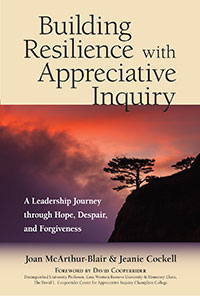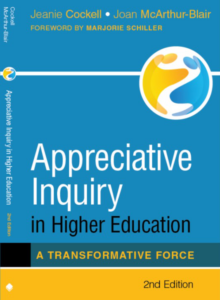Our Books
Building Resilience with Appreciative Inquiry
Leaders cannot predict the complex challenges they are called on to face. Veteran consultants Joan McArthur-Blair and Jeanie Cockell show that Appreciative Inquiry (AI) is an invaluable tool to build resilience.
AI is a widely used change approach that emphasizes identifying what’s working well in a system. Leaders can use AI to increase their ability to weather the storms they’ll inevitably encounter and be resilient. A profound guide, this book features personal accounts from leaders across a variety of settings describing how they’ve practiced appreciative resilience in the ongoing cycle of hope, despair, and forgiveness.
This book received a Nautilus Book Award. These awards “recognize, promote, and celebrate books that support conscious living & sustainability, high-level health & wellness, spiritual growth, and positive social change & social justice.”
What people are saying:
Appreciative Inquiry in Higher Education, 2nd Edition
Available now from your favorite online bookseller
The 2nd edition of this work expands, through a new Afterword, upon the practices and stories of two life time educators and consultants found in the 1st edition. The authors, who are committed to the use of Appreciative Inquiry (AI) in Higher Education have added in the new afterword new concepts, tools and ideas. The 2nd edition retains the wonderful stories, case studies, examples from the authors’ work and from colleagues around the world.
The book builds out of the foundations of AI and takes the reader on an ever deepening journey of how AI can be used to provide leaders, practitioners, faculty, and organizational developers with insights from AI fundamentals to new and evolving concepts, frameworks, and agendas. This book is both a thought provoking and practical resource.
Although designed for higher education many people across all sectors have found this book extraordinary in its clarity and usefulness when using appreciative inquiry.
The book builds out of the foundations of AI and takes the reader on an ever deepening journey of how AI can be used to provide leaders, practitioners, faculty, and organizational developers with insights from AI fundamentals to new and evolving concepts, frameworks, and agendas. This book is both a thought provoking and practical resource.
Although designed for higher education many people across all sectors have found this book extraordinary in its clarity and usefulness when using appreciative inquiry.
What people are saying:


